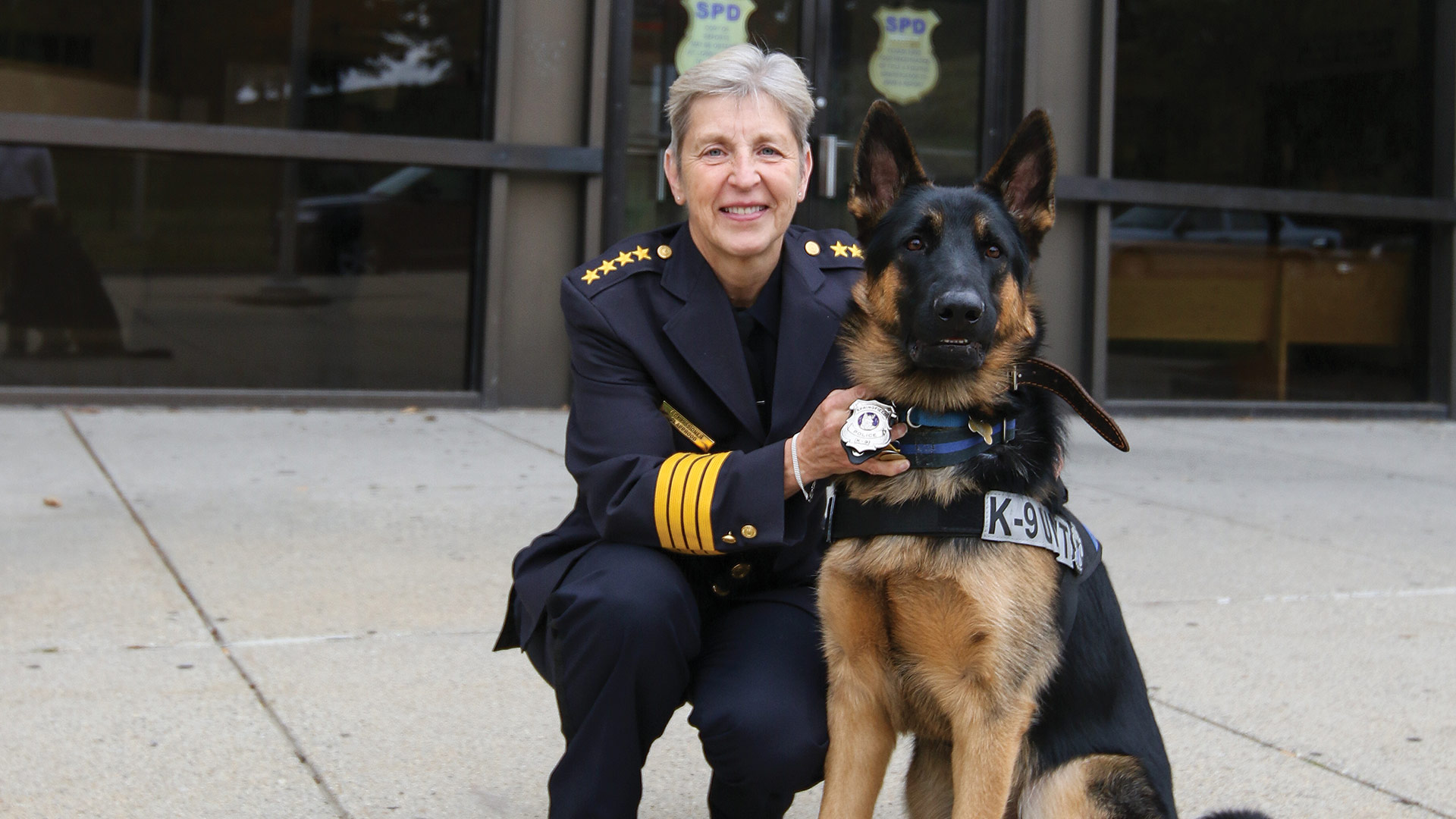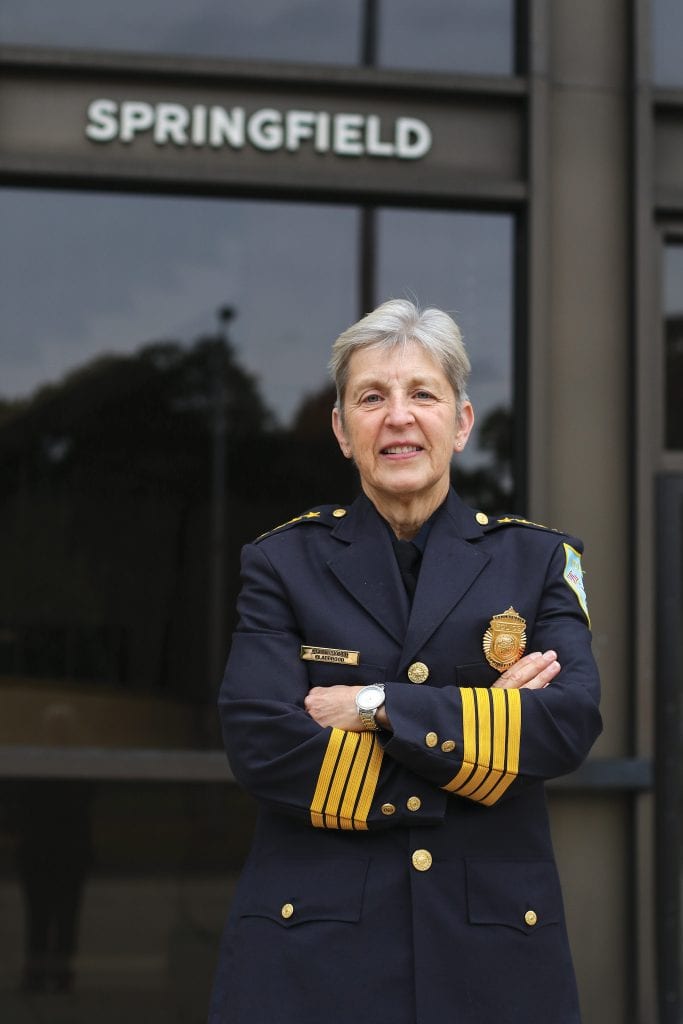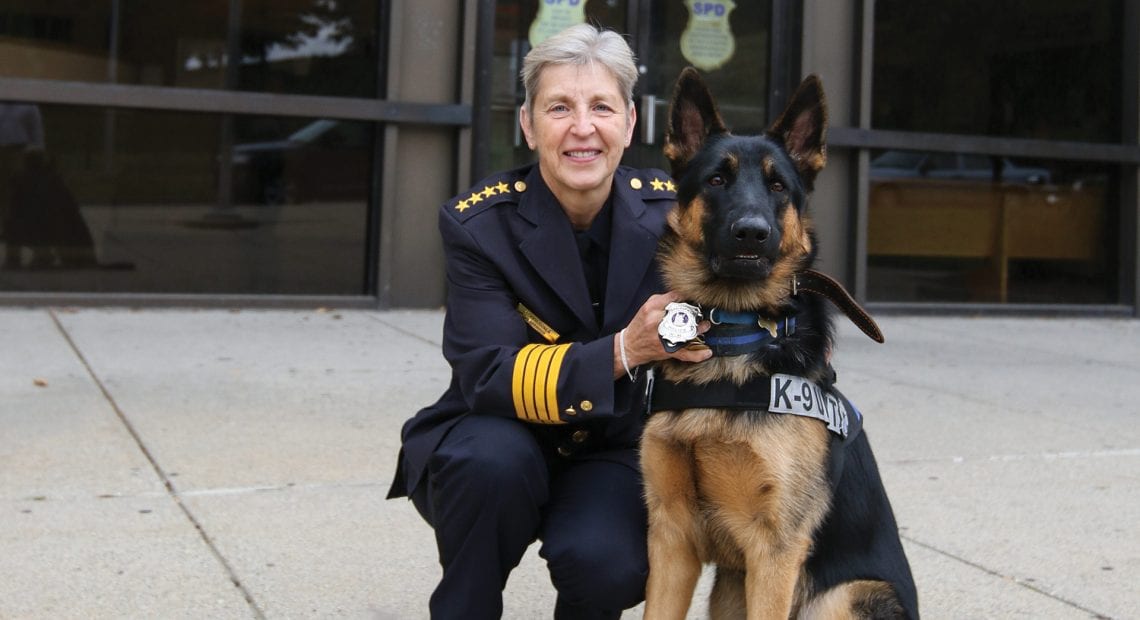Driving Force

Police Commissioner Cheryl Clapprood with Mango.
A few years ago, Cheryl Clapprood was thinking about retirement. But a love of the work and opportunities for advancement kept her in uniform, and with the abrupt resignation of Commissioner John Barbieri, she was put on a path to lead what has become an embattled department, one dealing with fallout from scandals, controversy, and staffing issues.
His name is Mango.
He’s a 1-year-old German shepherd who carries a badge.
Legend has it — and he’s already becoming legend — that he lacked the temperament or concentration needed to be to be a medical alert dog, like his parents — a highly trained canine that can sense when its master is about to have a seizure, for example. And he wasn’t (and still isn’t) aggressive enough to be a true police dog.
So … he has become a comfort dog for the department (more on that later) and an ambassador of sorts — his business card (yes, he has one) reads ‘Comfort K9’) — visiting area schools, showing up at various events, and becoming a face of the Springfield Police Department.
He joined the force, if that’s the proper term, in June, and he is getting comfortable in his new role and seemingly enjoying it more every day.
Those are sentiments are shared by the person he shares an office with — Springfield Police Commissioner Cheryl Clapprood, who dropped ‘interim’ from her title and was officially sworn in to her new position a month ago.
But she has been leading the force for roughly nine months now, since the abrupt resignation of John Barbieri amid a growing number of scandals involving the department. These include the arraignment of 13 current or former police officers on allegations that they either participated in or helped cover up the alleged 2015 off-duty police beating of four men outside Nathan Bill’s Bar & Restaurant, and also federal indictments stemming from alarming video showing Officer Greg Bigda threatening two juvenile suspects arrested for stealing an unmarked police car, among other recent incidents.
“When a couple of incidents happen, it sets you back, and people tend to lump us all together — it’s a profession where, when one officer does something, the rest of us pay the price, and that’s nationwide.”
In the wake of these scandals, Clapprood said, all those in the department are being painted with the same broad brush as those accused of abusing their power, and this is unfortunate, because the vast majority of officers don’t.
“When a couple of incidents happen, it sets you back, and people tend to lump us all together — it’s a profession where, when one officer does something, the rest of us pay the price, and that’s nationwide,” she said. “They treat us all the same, as if we had all committed these crimes. The video got out of Bigda in the cell block, and a lot of people were appalled and shocked at the behavior, but now, people think, ‘oh, that’s how the Springfield Police Department treats prisoners, that’s how they treat juveniles; it’s like we were all in that cell block with him.”
Still, the culture of the department needs to change, she said, adding that these scandals are just one of the challenges facing a department of roughly 500 officers. She told BusinessWest that police work is not as popular and glamorous as it was years ago, and it is, by almost all accounts, more dangerous. That means there are fewer people looking to enter law enforcement, she went on, and when you couple this with the number of officers currently on suspension and those planning to retire early next year, the department is facing a potential staffing crisis.
“We cannot recruit, and we cannot retain,” said Clapprood, adding that Springfield is certainly not alone when it comes to this challenge — other departments are facing the same issues. “We’re having a very difficult time recruiting and retaining officers, and every city in Massachusetts, and, from what I hear, every major city in the country, is facing the same problem.”
Despite these pressures and challenges, the department is, by most measures, creating progress when it comes to the incidence of many types of crimes, and in improving the perception of the city when it comes to public safety, especially in a downtown that is drawing ever-larger numbers of visitors since the opening of MGM Springfield.

Cheryl Clapprood, see here being sworn in as police commissioner, says the Springfield Police Department must change its culture to regain the confidence of the public.
“Violent-crime numbers are down, in large part because there are a lot of officers in the downtown area now,” she said, adding that the department’s relatively new Crime Analysis Unit, which crunches the numbers when it comes to what types of crimes are being committed and where, is also helping make the streets safer.
For this issue, BusinessWest talked at length with Clapprood about the state of public safety in the City of Homes and her efforts to change the perceptions of, and the culture within, the department she has been part of for four decades.
Out of the Blue
Clapprood told BusinessWest she recently met up with a woman she attended elementary school with a half-century or so ago. “She gave me a hug and said, ‘do you remember in the second grade when you said you wanted to be a cop?’”
Clapprood didn’t remember actually making that specific comment at that time, but she did recall always being drawn to that type of work.
“I was the crossing guard, I was in school security — I was in all those things,” she recalled, adding that her family lacked the money to send her to college, so she joined the Air Force, where she also gravitated toward the security side of the equation, and fully embraced it.
“It’s going to take some time. I knew we would not win back a good reputation in a short amount of time. It’s going to take some years to build this back up again. But you do it slowly; you show the community that you have officers who are professional officers who have integrity and do a good job.”
While stationed at Westover, she read in the local paper about the upcoming Springfield police cadet exam.
“I was 19, and I said, ‘that sounds really interesting,’” she recalled. “I took it, I passed, and became a police cadet in April 1979. And it’s just followed a course from there — I love the Springfield Police Department; it will be 41 years next April.”
Most police officers retire long before getting to 41 years — a fact of police work that is contributing to the staffing issues we’ll get to later — but Clapprood said she loved the work, and opportunities to advance continued to present themselves.
Fast-forwarding through four decades with the force, she said she gradually moved up in the ranks and eventually reached captain and eventually captain of the Community Action Division, which includes traffic, canine, C3 Policing (or what Clapprood calls “community policing on steroids”), and other programs. And that experience inspired her to stay on for a few more years.
She then took the assessment test for deputy chief, thinking it would be a good experience for her. She would soon discover that everyone else on the list for that post had retired, and with more retirements pending, she decided to hang in still longer.
It was a decision that would eventually propel her to the commissioner’s office, first as interim in February, and then on a permanent basis earlier this fall.
Since taking the helm, she has made it a point to get out in the community and meet with as many constituencies as possible, learning of their needs and concerns and letting them know what the department is doing to address them.
She’s also brought Mango into the department, giving him a role that is new to the force — comfort dog.

Police Commissioner Cheryl Clapprood says one challenge facing the police department — and all departments — is recruiting and retaining new officers.
“I don’t think people realize what the police officers go through on a daily basis, the things they see, and how it affects them,” she explained. “And he’s been a home run; I bring him to roll calls and the report room, and so far, everyone loves him. He makes trips around the station every day and goes to community events and meetings.
“Sometimes people come in here and they can be jacked up a little bit — they have problems and complaints,” she went on, referring to both members of her department and the general public. “I always ask, ‘are you all right with a dog?’ By the time they’re done petting him and him kissing them, they’ve come down to a level that’s very amicable for me.”
Arresting Developments
But there are a number of issues and problems that can’t be solved with a visit to or from Mango, and these are the matters currently absorbing most of Clapprood’s time.
The department’s scandals and the image problems they’re creating are at the top of this list, she said, adding that she knew changes needed to be made even before she became commissioner.
“You can’t waffle, and you can’t wait for problems to go away — that tends to cause you more problems than you had before,” she told BusinessWest, adding that she is taking a proactive approach to the issues facing the department and bringing about a change in the culture.
“It comes back to instilling discipline, it comes back to training, it comes back to accepting responsibility,” she explained. “That’s what I preach at the staff meetings and with the officers, and you have to lead by example.
“When I was a young police officer here, you’d have to force people out at 65; they were fighting it, calling it age discrimination and threatening to file suit. They didn’t want to go at 65. But it’s a tough job now, and I can’t blame people for wanting to retire earlier.”
“And it’s going to take some time,” she went on. “I knew we would not win back a good reputation in a short amount of time. It’s going to take some years to build this back up again. But you do it slowly; you show the community that you have officers who are professional officers who have integrity and do a good job.”
Meanwhile, another matter is keeping the department staffed, a considerable challenge given the fact that many officers are retiring at an earlier age than a generation ago and fewer young people are looking to enter what was once a proud profession.
“They go early now,” she said, referring to officers and retirement. “When I was a young police officer here, you’d have to force people out at 65; they were fighting it, calling it age discrimination and threatening to file suit. They didn’t want to go at 65.
“But it’s a tough job now, and I can’t blame people for wanting to retire earlier,” she went on. “There have been a few on-duty deaths in recent years, and the last one [Officer Kevin Ambrose] shook up a lot of people.”
Clapprood told BusinessWest that the staffing challenges will soon force some hard decisions on which programs it can continue to operate. For the long term, she worries that such issues will force her department and others to lower their standards when it comes to who can eventually wear a badge.
“In time, lowering standards can cause more problems,” she said, adding that, while once the department desired a bachelor’s degree and later an associate degree, it will now accept a GED. “You might see people here who maybe are not mature enough or didn’t want it for the right reasons; it will bring about a host of other issues.”
As she noted, there are positive things happening within the department and across the city from a public-safety perspective, but these developments are getting lost amid the scandals and negative press.
In an effort to shed some light on them, Clapprood has gone on radio talk shows and writes a regular column for the Republican in an effort to get the word out.
This month’s offering is typical of the submissions: there is commentary on timely topics — October is Domestic Violence Awareness Month, so she discussed the department’s team of domestic-violence advocates — as well as relevant updates, specifically one on the pending decision on which vendor will supply the department with body-worn cameras.
“Cameras aren’t perfect, but they will be beneficial both to our officers and our residents,” she wrote, echoing comments she offered to BusinessWest on this subject. “Just about every department to which we’ve spoken said complaints about officers nearly disappear once they implement a body-worn camera program.”
She also shares news about the department — this month there was mention of how Bill Schwarz, the department’s Crime Analysis director, was recently presented with the International Assoc. of Crime Analysts membership award — as well as another warning about scams and a reminder that photos of she and Mango for the police officers’ ball book can be seen on Mango’s Facebook page.
“I’m trying to get out a lot of good and a lot of the things that we do here,” she said. “And it’s been received very well.”
Paws for Effect
Like most dogs, Mango now has the run of the house — well, Clapprood’s office, anyway
There’s a dog bed not far from the commissioner’s desk, and she likes that he recently developed an affinity for the couch that sits in the corner.
“No one else likes to sit there, so I guess it’s Mango’s,” she said, adding that she and the department’s comfort dog are both growing into their jobs — and they both have a detailed job description.
Clapprood’s can be boiled down to putting her department and all its officers in a position to succeed while also changing the culture within the department, and, at the same time, making the city a safe place to visit and for those who live and work here.
There is considerable work to be done and challenges to be overcome, but Clapprood believes the department can get where it wants and needs to go. It won’t happen overnight, as she said, but it can happen slowly but surely.
Leading those efforts has been a life-long ambition, or at least since the second grade, according to at least one account.
George O’Brien can be reached at [email protected]





